Sunday Feb 22, 2026
Sunday Feb 22, 2026
Thursday, 5 August 2021 00:00 - - {{hitsCtrl.values.hits}}
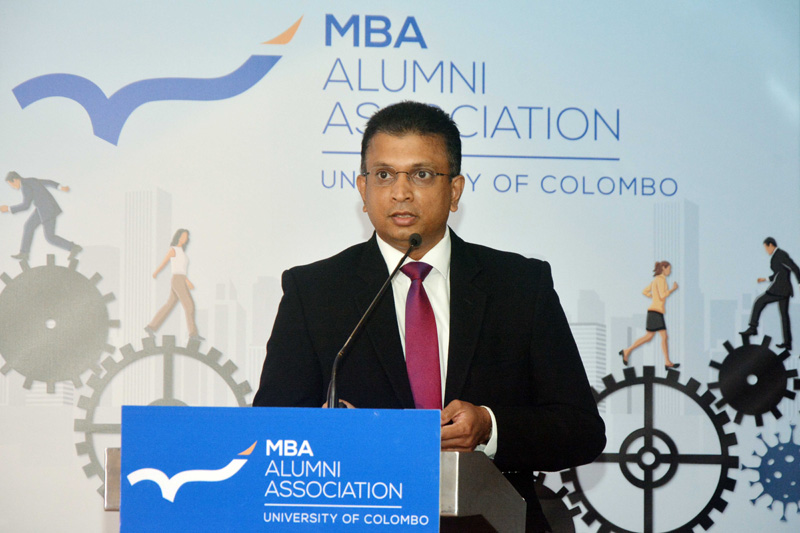
Chief Guest Dialog Axiata Director and Group Chief Executive Supun Weerasinghe
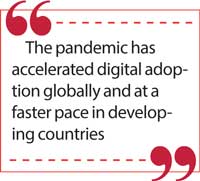 |
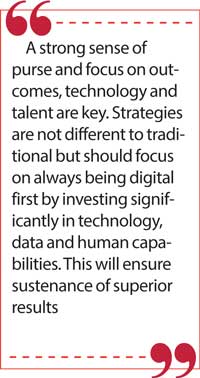 |
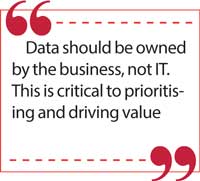 |
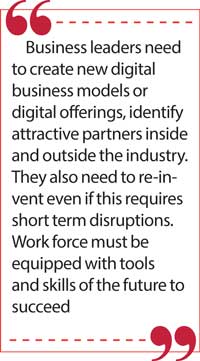 |
University of Colombo MBA Alumni Association’s Annual General Meeting Chief Guest Dialog Axiata Plc Group CEO Supun Weerasinghe in his speech shared useful insights to the ‘Digital transformation:
From crisis to opportunity’.
Drawing global historic examples he said crises often lead to long-lasting changes, new policies, new ways of working and new consumer behaviours. He said even before the COVID-19 pandemic, the world was seeing the rise of the digital customer with phenomena of shifting from products and services to looking for experiences, from ownership to access and amidst the pandemic from lockdowns to new normal and hyper personalisation.
"The pandemic has accelerated digital adoption globally and at a faster pace in developing countries," he said. He cited the famous case study of ‘Blockbuster Vs. Netflix’ to drive home the point that even before the pandemic, ignoring digital was suicidal.
He said digital transformation changes business models. "A business model is defined by the way an organisation creates value and by the way it captures value," he added.
It was pointed out that digital value creation means network economies will generate new opportunities for value creation and digital value capture entails new data and business combinations that can create more options for an organisation to monetise the value it creates.
The operating model involves scale, scope and continuous learning. Weerasinghe said companies need to assess how digital they are in terms of customer experience and business model.
According to him, business to consumer and tech industries are best positioned for digital transformation whilst digitally mature industries have a higher likelihood of success aided by fundamental factors such as agile governance, leadership commitment, effective monitoring, integrated strategy, high-calibre talent and use of modular tech, data platforms.
"A strong sense of purse and focus on outcomes, technology and talent are key," he said, adding that strategies are not different to traditional but should focus on always being digital first.
He told the Colombo University MBA Alumni AGM that creating 'digital first' organisations by investing significantly in technology, data and human capabilities will ensure sustenance of superior results. He also said AI driven companies can outstrip traditional firms.
Focusing on the post-COVID scenario, he said the pandemic interrupted, accelerated or reversed long standing consumer and business habits.
"The pandemic accelerated changes in consumer and business behaviours are likely to persist," Weerasinghe said. "Many changes in business models and consumer behaviour seen during the pandemic will continue but action will be needed to ensure the rebound in post COVID period is not uneven," he emphasised.
To succeed in the digital wave, the Dialog Axiata Plc Group CEO shared several recommendations.
First he said firms and management needs to decouple digital transformation from the core systems transformation. "Digital transformation is for greater business agility and lower IT risk. The core transformation runs at its own pace," he added.
He also said data must be liberated from the core systems. "Data should be owned by the business, not IT. This is critical to prioritising and driving value," Weerasinghe said.
The need to build new capabilities was also stressed. "Differentiating engineering capabilities should be built in-house. Having engineers close to the frontlines improves time to value," he emphasised.
Firms also need to use iterate deployment methods. "To respond to customer demands and improve overall resiliency, new tools and services need to be deployed to the frontline regularly or every quarter and not once a year or two," he said,
He also emphasised the need to focus on speed to value. "If a digital project cannot be sliced into smaller pieces for quicker implementation and will take several years, then it should be wrapped up immediately even if the investment was substantial. If not the digital experience it creates will be obsolete from day one," he added.
He said business leaders need to create new digital business models or digital offerings, identify attractive partners inside and outside the industry. They also need to re-invent even if this requires short term disruptions. Work force must be equipped with tools and skills of the future to succeed. Weerasinghe also said data security and privacy were important to protect organisations from cyber-attacks.